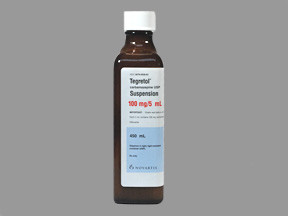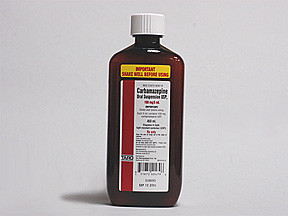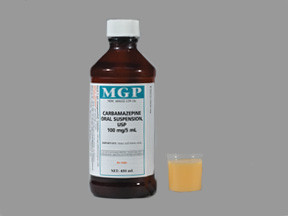CARBAMAZEPINE SUSPENSION - ORAL
PHONETIC PRONUNCIATION: (kar-bam-AZZ-eh-peen)
COMMON BRAND NAME(S): Tegretol
GENERIC NAME(S): carbamazepine
Uses
USES: Carbamazepine is used to prevent and control seizures. This medication is known as an anticonvulsant or anti-epileptic drug. It is also used to relieve certain types of nerve pain (such as trigeminal neuralgia). This medication works by reducing the spread of seizure activity in the brain and restoring the normal balance of nerve activity.
How to use CARBAMAZEPINE SUSPENSION - ORAL
HOW TO USE: Read the Medication Guide provided by your pharmacist before you start using carbamazepine and each time you get a refill. If you have any questions, ask your doctor or pharmacist. Shake the bottle well before each dose. Carefully measure the dose using a special measuring device/spoon. Do not use a household spoon because you may not get the correct dose. Take this medication by mouth with food as directed by your doctor, usually 3 or 4 times a day. Separate doses of this drug from other liquid medicines by at least 2 hours. The dosage is based on your medical condition and response to treatment. To reduce your risk of side effects, your doctor may direct you to start this medication at a low dose and gradually increase your dose. Follow your doctor's instructions carefully. Avoid eating grapefruit or drinking grapefruit juice while using this medication unless your doctor or pharmacist says you may do so safely. Grapefruit can increase the chance of side effects with this medicine. Ask your doctor or pharmacist for more details. Take this medication regularly to get the most benefit from it. To help you remember, take it at the same times each day. Keep taking this medication even if you feel well. Do not stop taking this medication without consulting your doctor. Some conditions (such as seizures) may become worse when this drug is suddenly stopped. Your dose may need to be gradually decreased. Tell your doctor if your condition does not get better or if it gets worse.
Side Effects
Precautions
Interactions
Overdose
Images
Reviews
Faq for CARBAMAZEPINE SUSPENSION - ORAL
Carbamazepine suspension is an oral medication used to treat certain types of seizures and nerve pain. It belongs to a class of drugs called anticonvulsants.
Carbamazepine suspension works by reducing abnormal electrical activity in the brain, which helps control seizures. It also relieves nerve pain by affecting certain chemicals in the brain.
Carbamazepine suspension can be taken by adults and children who have been diagnosed with epilepsy or certain types of nerve pain, such as trigeminal neuralgia.
You should take carbamazepine suspension exactly as prescribed by your doctor. Typically, it is taken two to four times a day with or without food. Shake the bottle well before use.
Common side effects of carbamazepine suspension may include drowsiness, dizziness, nausea, vomiting, constipation, or dry mouth. These usually go away as your body adjusts to the medication.
Yes, there are some serious side effects associated with carbamazepine suspension. These can include severe allergic reactions, low blood sodium levels, liver problems, or blood disorders. Contact your doctor immediately if you experience any unusual symptoms.
It is generally not recommended to drink alcohol while taking carbamazepine suspension, as it may worsen certain side effects and increase the risk of liver damage. Consult with your doctor for personalized advice.
Yes, carbamazepine suspension may interact with other medications, including blood thinners, antidepressants, birth control pills, and certain antibiotics. Make sure to inform your doctor about all the medications you are taking.
It is important to discuss the risks and benefits of taking carbamazepine suspension during pregnancy or while breastfeeding with your doctor. The medication may have potential risks to the fetus or infant.
Warning
WARNING: Carbamazepine may rarely cause very serious (possibly fatal) skin reactions. Some people in certain ethnic groups (such as people of Asian/South Asian descent) are at greater risk. Your doctor may order a blood test to measure your risk before you start this medication. If the blood test shows you are at greater risk, your doctor should discuss the risks and benefits of carbamazepine and other treatment choices with you. Such skin reactions have developed mostly within the first few months of treatment. Get medical help right away if you develop any of the following symptoms: skin rash/blisters/peeling, itching, or swelling. Ask your doctor or pharmacist for more details. This drug has rarely caused very serious blood disorders (aplastic anemia, agranulocytosis). Your doctor will monitor your blood counts to minimize the chance of these side effects. Keep all medical and lab appointments. Get medical help right away if any of these rare but very serious side effects occur: signs of infection (such as sore throat that doesn't go away, fever, swollen lymph nodes), unusual weakness/tiredness, shortness of breath, or easy bleeding/bruising.
Disclaimer
IMPORTANT: HOW TO USE THIS INFORMATION: This is a summary and does NOT have all possible information about this product. This information does not assure that this product is safe, effective, or appropriate for you. This information is not individual medical advice and does not substitute for the advice of your health care professional. Always ask your health care professional for complete information about this product and your specific health needs.




No Reviews Yet